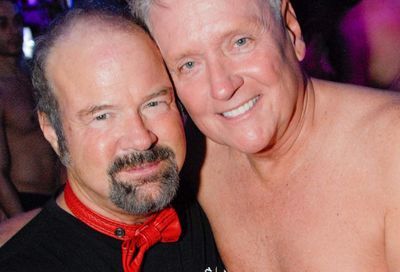The New York Effect
Commentary: OutRight
In the past few weeks, gay-marriage advocates pursuing their goal by filing lawsuits have suffered several defeats. The most surprising and most significant of these came in New York, where the Court of Appeals rejected state constitutional claims to same-sex marriage. I want to explore some effects of the decision on the cause of same-sex marriage.
First, the New York decision may be followed by other state courts. Right now, litigation is pending in eight state court systems. We await decisions from the high courts of two states, New Jersey and Washington. New York is a large state and its courts are well regarded.
At the same time, it’s a politically liberal state. The New York decision could provide cover, jurisprudentially and politically, to judges in other states who want to reject gay-marriage claims but who are concerned about the perception of legal elites that they are denying the next great civil-rights cause. If New York’s high court can do it, it can’t be blind bigotry or ignorance to reject these claims, can it? Thus, the New York decision could be influential on this issue in a way that, say, the Alabama Supreme Court would not be. The New York opinion may therefore damage the prospects of gay-marriage litigants elsewhere.
I would not make too much of this, however. Judges will tend to have a view of the issue going in, and I doubt that they’ll be converted by the opinion of four judges in Massachusetts in one direction or four judges in New York in the other direction.
A second effect may be to soften the remedial demands made by future gay-marriage litigants. Instead of insisting on full marriage or nothing, as the New York plaintiffs did, perhaps litigants will be more likely to settle for an alternative status, like civil union or domestic partnership, that offers the benefits and rights of marriage without the name. This might marginally increase their chances for success.
Future state courts might see the current landscape as offering three models for resolution of gay-marriage claims: Massachusetts (full marriage), New York (nothing), and Vermont (civil unions, with directions to the state legislature to work out the details). They might see the Vermont resolution as a middle position between the extremes of New York and Massachusetts, allowing them to give gay couples the benefits and protections of marriage without risking the political backlash that comes with the word ”marriage.”
A third effect should be to reduce and to delay litigation arising from inter-state conflicts in marriage law. New York is the third most populous state, with a high concentration of homosexuals. Its residents, especially in New York City, are highly mobile. In short order, its gay married residents would have moved to or traveled in other states, gotten into legal conflicts with each other or with third parties, and sought some out-of-state recognition for their relationships.
I think discordant state policies in this area can be dealt with under traditional legal principles. And these conflicts will occur anyway, since we already have gay marriage and alternative statuses in a few states. But there is no doubt the sheer number of such issues coming from New York would have heightened tensions over the gay-marriage issue very quickly and added to calls for a national resolution via constitutional amendment.
Fourth, perhaps there’s a silver lining in the New York loss. Losing such an important judicial decision may force the gay-marriage movement to emphasize legislative progress, which will produce gains that are more durable and less likely to infuriate opponents than are court victories. In past columns, I have argued for an emphasis on legislative progress toward gay marriage.
Will the New York decision re-order priorities toward legislation? Certainly in New York the Legislature is for now the only available arena. But with Republicans fairly comfortably in control of the state Senate and presently the governor’s mansion, gay marriage is not coming to New York anytime soon. Instead, New York will have to be one of the states where, if progress is to be made in the near-term at all, it will have to be made by degrees.
Outside New York, the decision might be the beginning of the end for the strong emphasis on litigation that has marked the early part of the gay-marriage cause. Despite the exaggerated claims of some federal amendment supporters, there aren’t that many state court systems likely to be hospitable to gay-marriage claims for the foreseeable future. (The federal courts are hopeless, as litigation strategists know.) While gay-marriage litigation strategists might once have hoped to build momentum for a state-by-state judicial sweep, producing a few initial court victories in very friendly states that would lead to later court victories in less friendly states, that hope has been diminished by the New York defeat and even more by the political backlash to gay marriage.
Once existing litigation has worked its way through those few state court systems where litigants have a reasonable prospect of success, as such litigation is now doing, gay-marriage advocates will have to turn primarily to legislatures.
As in other social and political movements in this country, the courts will have helped along the way by highlighting the strength of the principled arguments and especially by getting some isolated experiments started. But there will be no substitute for making the case to the people and their representatives.
Dale Carpenter is a law professor. He can be reached at OutRight@metroweekly.com.
Support Metro Weekly’s Journalism
These are challenging times for news organizations. And yet it’s crucial we stay active and provide vital resources and information to both our local readers and the world. So won’t you please take a moment and consider supporting Metro Weekly with a membership? For as little as $5 a month, you can help ensure Metro Weekly magazine and MetroWeekly.com remain free, viable resources as we provide the best, most diverse, culturally-resonant LGBTQ coverage in both the D.C. region and around the world. Memberships come with exclusive perks and discounts, your own personal digital delivery of each week’s magazine (and an archive), access to our Member's Lounge when it launches this fall, and exclusive members-only items like Metro Weekly Membership Mugs and Tote Bags! Check out all our membership levels here and please join us today!






















